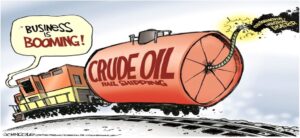20 September 2018
‘They Thought It Was Oil Over – Not Quite Yet’

This time last year the markets suggested that it was all over for oil. With the price languishing at around $40 a barrel, the world was supposed to be swimming in oil as well as plastic. Oil, not good for the climate, had had its day. So, with the latest climate report describing a strong risk of crisis as early as 2040, the sharp rise in the oil price to a four year high seems to go against intuition.
While Global Politics, Middle East tensions and Venezuelan malaise are partly to blame, a bigger reason for the price rise comes from the lower oil price of the past few years. This lower price has helped increase oil consumption which has risen to all-time highs. Incredible you may think given car efficiencies, green energy and all. However; the world now consumes nearly 100 million barrels of oil a day! It’s not just price behind this increased consumption. The difficulty to reduce consumption can be seen from how much oil is used across the world. In the US an average of over 13 barrels of oil are consumed per person per year. In Europe it’s about 11, and in the developing world it’s 4.5 barrels a year. With most of the population in the developing world it’s easy to see how demand will keep growing.
In addition, when an oilfield starts pumping it produces the most oil at the start of its life, thereafter production gradually declines. This means that oil production from the world’s existing fields declines at about 4% per annum. If you stop looking for oil, production declines sharply. With the low prices of recent years that is precisely what has happened. Far fewer discoveries have been made. Shale gas in the US is somewhat of an exception but will not be enough to offset ongoing declines.
All this has created a bottleneck and sent prices soaring. This matters as oil’s importance to the global economy is only surpassed by the current global trade wars. A $10 per barrel move in the oil price negatively impacts global economic growth estimates by about 0.8%. The oil price is $40 above where it was last year, so no wonder there are warnings of an imminent economic slowdown.
All this means is – it’s not all over for oil. The problem for the world is to manage a decline in oil usage, without tipping the price balance one way or another. Lower prices stimulate greater demand and therefore more pollution. Soaring prices could slow global growth to the point where the world’s economies are tipped into recession. This hits the wealth creation required to invest in technologies to meet climate change targets. It was no coincidence that the financial crisis of 2008 coincided with a $140 per barrel oil price.
For investing, it means we continue to look for alternative energy producers and technologies that will help the world reduce its carbon footprint. In the meantime, oil will remain a vital part of the global economy and its price remains a key indicator of what will happen to global growth, investment returns and the success of climate charge initiatives. The world economy, sadly, remains all about oil….